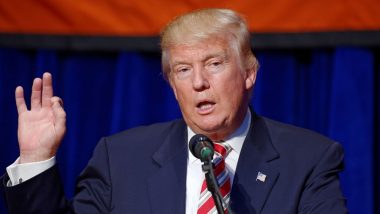Washington/Beijing, May 10: A trade war between the world's two largest economies escalated on Friday after the US more than doubled tariffs on USD 200 billion worth of Chinese products and Beijing vowed to retaliate. The Trump administration's move comes as high-level officials from both sides are attempting to salvage a trade deal in Washington.
The higher tariffs will be applied to relevant US-bound goods exported from China on or after Friday, according to a notice from the US Federal Register. Tariffs are taxes paid by importers on foreign goods, so the 25 per cent tariff will be paid by American companies who bring Chinese goods into the country.
The US imposed a 10 per cent tariff on USD 200 billion worth of Chinese products - including fish, handbags, clothing and footwear - last year. China, US Bilateral Trade Declines Amid Trade War Between Two Economies.
The US raised tariffs on USD 200 billion worth of Chinese imports from 10 per cent to 25 per cent on Friday, China's Ministry of Commerce said in Beijing.
"China expresses deep regret over the development and will have to take necessary countermeasures," the ministry said in a statement.
"We hope the United States will meet us halfway, and work with us to resolve existing issues through cooperation and consultation," the statement said.
A Chinese delegation led by Beijing's top trade negotiator Vice Premier Liu He arrived in Washington on Thursday for the latest round of trade talks.
Under the current circumstances, Liu said he "hopes to engage in rational and candid exchanges with the US side," he was quoted as saying by China's state-run Xinhua news agency.
Liu said that China believes raising tariffs is not a solution to the problems and is harmful to China, to the United States and to the whole world. Talks between the two sides will resume in Washington on Friday, hours after the tariffs took effect.
Reactions in Asia markets to the US move were mixed. Having started the day in positive territory, Japan's Nikkei Index fell nearly 1 per cent in afternoon trading. The Shanghai Composite Index rose more than 2 per cent and Hong Kong's Hang Seng Index was up around 1 per cent.
Even though President Trump has downplayed the impact of tariffs on the US economy, the rise is likely to affect some American companies and consumers as firms may pass on some of the cost, analysts said.
Deborah Elms, executive director at the Asian Trade Centre, said: "It's going to be a big shock to the economy.
"Those are all US companies who are suddenly facing a 25% increase in cost, and then you have to remember that the Chinese are going to retaliate."
Trump's surprise move to increase tariffs startled US businesses. Importers received just five days' notice about the sudden rise in penalties, CNN reported.
"The tariff increase inflicts significant harm on US industry, farmers and consumers," said Jacob Parker, vice president of the US-China Business Council, a trade group that represents American companies' interests in China.
"It will decrease the competitiveness of American companies, reduce the efficiency of their global supply chains, and reverberate through the US economy. Pure and simple, this is a tax on the American consumer," he said.
The American Apparel and Footwear Association estimated that a 25 per cent tariff on apparel imports would increase costs for a family of four by USD 500 a year.













 Quickly
Quickly


